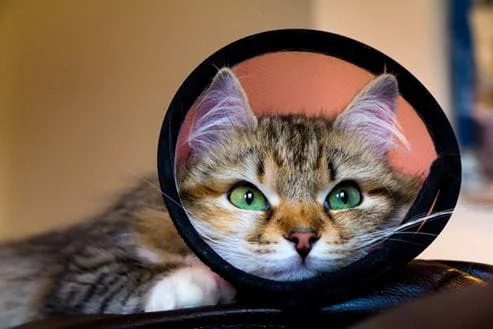According to a recent report released by the American Humane Society, animal shelters across the country euthanize 2.4 million healthy dogs and cats each year due to pet overpopulation. No one steps forward to adopt these animals in the organization’s time limit and a staff member has to euthanize them to make room for other incoming homeless pets. This leads to one healthy animal losing his or her life every 13 seconds in America alone. While this is a sad and frustrating statistic, it’s also preventable with spay or neuter surgery. Let's discuss the procedures and their benefits further.

What Happens During a Spay or Neuter Surgery?
When your pet is dropped off for a spay or neuter surgery with us, our first priority is ensuring your pet is healthy enough for the procedure. If we haven't performed bloodwork already, we will that morning to verify that their blood cell counts and chemistries look healthy and normal. We will also listen to their heart and lungs to check for any murmurs or other abnormalities.
Once we've made sure your pet is healthy enough to undergo the procedure, it's our job to ensure their comfort and safety throughout it. We give an injection of medications that will induce sedation, and place a catheter to ensure we have access to a vein during the procedure. Once they're ready, they will be maintained on a gas anesthetic and additional pain control medications may be used as the vet begins surgery. They will be monitored by a surgery technician the entire time, checking vitals to keep your pet safe.
In a neuter, the testicles are removed through an incision made in the scrotum and the vet ties off the vas deferens that controls it's blood supply. It's an easy procedure, and has a quick recovery time. A spay surgery is a bit more in-depth, as it's an abdominal surgery that involves the complete removal of the ovaries and uterus. This means that your female pet will require extra rest time and pain control, and she must not be able to reach her abdominal incision. We recommend keeping their e-collars on at all times.
Benefits of Spaying
Unaltered female cats and dogs go through heat cycles. These cycles can increase your pet's desire to roam outside and away from your home, be messy, and make them prone to more aggressive and territorial behaviors. Cats tend to go through more frequent heat cycles, but dogs can still get pregnant more than once a year. This means that during a pet's lifetime, they can birth many litters which is why it's so important to spay them.
In addition to those reasons, the physical benefits of a spay include reducing the risk of pyometras, an infection of the uterus that can occur in both dogs and cats after a heat cycle. Their risk of mammary cancer is also lessened significantly if they are spayed, especially before their first heat cycle. With that being said, not all dog breeds should be spayed at the normally recommended time of 4 to 6 months of age. This is something to discuss with the vet at the time of your pet's first spay consult, where we'll formulate a plan together to create the best outcome for you and your pet.
Benefits of Neutering
Unaltered male cats and dogs are both primarily at risk for acting aggressively if left intact, and can bring that energy and danger to other pets and people they interact with outside as a result of being more territorial and focused on mating. Both cats and dogs who are left intact also tend to have extremely foul smelling urine and are content to use it to mark in and around your home to establish their territory. It is very hard to get rid of this smell, and you usually have to use enzymatic cleaners.
The physical benefits of a neuter for a cat or dog include significantly decreasing the risk of developing prostate cancer later in life, which can be an incredibly aggressive form of cancer. Just like with females, not all dog breeds should be neutered at the normally recommended 4 to 6 months of age. Some larger breeds specifically need a little more time to grow before being neutered. This is something we will discuss at your pet's neuter consult if relevant to your pet's breed.
Call, text or email us with any questions you have about spaying or neutering your pets!


